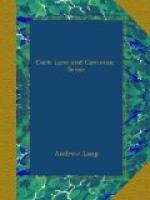So far, everybody is agreed: the differences begin when we ask what causes hallucinations, and what different classes of hallucinations exist? Taking the second question first, we find hallucinations divided into those which the percipient (or percipients) believes, at the moment, and perhaps later, to be real; and those which his judgment pronounces to be false. Famous cases of the latter class are the idola which beset Nicolai, who studied them, and wrote an account of them. After a period of trouble and trial, and neglect of blood-letting, Nicolai saw, first a dead man whom he had known, and, later, crowds of people, dead, living, known or unknown. The malady yielded to leeches. {183} Examples of the first sort of apparitions taken by the judgment to be real, are common in madness, in the intemperate, and in ghost stories. The maniac believes in his visionary attendant or enemy, the drunkard in his rats and snakes, the ghost-seer often supposes that he has actually seen an acquaintance (where no mistaken identity is possible) and only learns later that the person,—dead, or alive and well,—was at a distance. Thus the writer is acquainted with the story of a gentleman who, when at work in his study at a distance from England, saw a colleague in his profession enter the room. ’Just wait till I finish this business,’ he said, but when he had hastily concluded his letter, or whatever he was engaged on, his friend had disappeared. That was the day of his friend’s death, in England. Here then the hallucination was taken for a reality; indeed, there was nothing to suggest that it was anything else. Mr. Gurney has defined a hallucination as ’a percept which lacks, but which can only by distinct reflection be recognised as lacking, the objective basis which it suggests’—and by ‘objective basis,’ he means ’the possibility of being shared by all persons with normal senses’. Nobody but the ‘percipient’ was present on the occasion just described, so we cannot say whether other people would have seen the visitor, or not. But reflection could not recognise the unreality of this ‘percept,’ till it was found that, in fact, the visitor had vanished, and had never been in the neighbourhood at all.
Here then, are two classes of hallucinations, those which reflection shows us to be false (as if a sane man were to have the hallucination of a crocodile, or of a dead friend, entering the room), and those which reflection does not, at the moment, show to be false, as if a friend were to enter, who could be proved to have been absent.
In either case, what causes the hallucination, or are there various possible sorts of causes? Now defects in the eye, or in the optic nerve, to speak roughly, may cause hallucinations from without. An injured external organ conveys a false and distorted message to the brain and to the intelligence. A nascent malady of the ear may produce buzzings, and these may develop into hallucinatory voices.




